

The time of the year is here! Camp fires on cool evenings, sweater and hoodie weather, bowls of chili, football, what a time to be alive! I am the first one on board with last minute calling some family and friends over for a camp fire and roasting hotdogs and marshmallows. This is a huge pastime in our area and something that people do on the weekends or just any random night, but we definitely have to remember our camp fire food safety tips when having these get togethers. Whether we are cooking at home or on a weekend camping trip here are some good to know tips:
You probably do not need to haul a heavy Dutch oven if you only plan to cook hot dogs and toast marshmallows for an afternoon picnic. In such a case, you will only need to pack skewers and fire-starting supplies. However, if you are camping for a few days and have a list of Dutch oven recipes you cannot wait to try, it is worth bringing a cast-iron pot.
Keep your camping trip free of illness and pay careful attention to how you store your food. Keep raw meat packed in ice right up until the moment you are ready to grill, because bacteria proliferate when food is between 40 and 140 degrees. Make sure to put leftovers away within two hours — and, in hot weather, do not leave food out longer than an hour.
Store food in airtight bags or containers and keep them in coolers. Bring one cooler for drinks and another for perishable food items, and pack the coolers full. You can use frozen gel packs, ice cubes or frozen bottles of water in the cooler. Lastly, keep hands clean with disposable wipes or eco-friendly soap.
Prep at Home
It is much easier to slice and dice peppers and onions in your kitchen than it is at the campsite. Keep things simple and prepare as many ingredients as you can at home. For example, if you are excited to make campfire scrambled eggs, crack and scramble the eggs at home and store them in bottles for the trip.
When you are ready to cook, make sure all your utensils are clean and within reach. You do not want to leave your food unattended while you search for your spatula or spoon. When you plan your meals and come prepared, campfire cooking will be a stress-free experience.
About the Fire
You might be tempted to create a fire with huge, roaring flames, but this will not do much for your baked bean recipe. Large fires burn down fast, and you do not want to use all your firewood at once. Spend your wood wisely, and you will have plenty left over for a post-dinner snack and campfire stories.
Get your fire going at least an hour before cooking to allow plenty of time for flames to die down and coals to get hot. Also, keep in mind cooking on a campfire takes longer than it does in your kitchen at home. You will need to turn food every so often for even cooking, and use a thermometer to make sure you have cooked everything to safe levels.
When we are bringing food outside to prepare I make sure that I at a minimum have a cooler bag (if preparing quickly) or a cooler with ice packs if I am preparing food later in the evening. I like to bring the condiments out as close to eating as I can as well as any foods that might have been prepared indoors. This is one of the best perks of having the fire at home where we can use our creature comforts as well as “roughing it” by cooking outside. We use table coverings and have even purchased some of the domes to keep flies away from the food while people are preparing to get their plates made.
We make sure that the hot dogs are cooked properly on forks that are long enough to prevent burns and those even let kids participate more. This creates the most memories and allows kids to feel as independent as they can.
While creating memories with your friends and family always remember to practice food safety tips and tricks to prevent any illnesses. Keep an eye on Make Food Safe for more seasonal food articles and updates on important recall information.
If glycerol intoxication syndrome sounds scary, that’s because it is. One of the main causes…
Nitrous Oxide canisters have recently gained in popularity for their novel culinary use. However, misuse…
A source, packaged sandwiches and convenience foods produced by Fresh & Ready Foods, LLC, has…
The newest update to the Environmental Working Group’s (EWG) tap water database identifies hundreds of…
Most people don't eat fast food because it's good for us, but that doesn’t mean…
Honeybee deaths may be another tragic reason your grocery bill increases. Trade agreements and bird…